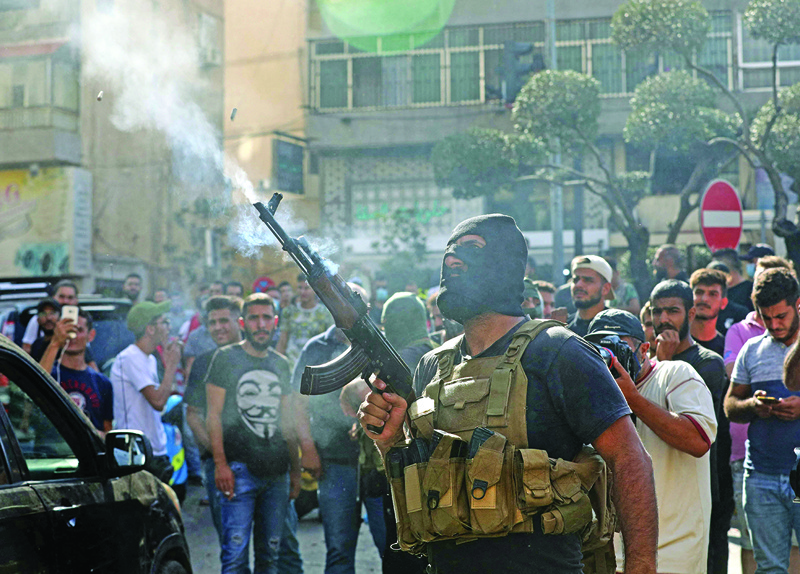 BEIRUT: A member of Lebanon’s Hezbollah movement fires his gun during the funeral of some of their members who were killed during clashes in the Tayouneh neighborhood of the capital Beirut’s southern suburbs. – AFP
BEIRUT: A member of Lebanon’s Hezbollah movement fires his gun during the funeral of some of their members who were killed during clashes in the Tayouneh neighborhood of the capital Beirut’s southern suburbs. – AFPBEIRUT: Lebanon buried the victims Friday of its deadliest sectarian unrest in years after gunfire gripped central Beirut for hours and revived the ghosts of the civil war. Seven people died and dozens were wounded when violence erupted Thursday following a rally by Shiite Muslim protesters demanding the dismissal of the judge investigating last year's devastating Beirut port blast. The Shiite movements Amal and Hezbollah that organized the protest in front of the Justice Palace accused the Lebanese Forces (LF) Christian party of engineering the chaos by aiming sniper fire at the demonstrators.
"This massacre was committed by the LF movement," senior Hezbollah official Hashem Safieddine said during a Beirut funeral on Friday, accusing the party of seeking to "start a civil war". "We will not be dragged into sectarian strife... but at the same time we cannot allow the blood of our martyrs to go to waste," he added. In Beirut's southern suburbs, Hezbollah held burials for two of its members as well as a woman who was shot in the head by a stray bullet while she was standing on her balcony.
Hundreds of mourners chanting in support of the Iran-backed group carried caskets wrapped in the party's yellow flag as prayers rang out from loudspeakers. Gunshots were fired in the air and flowers laid on caskets at funerals in southern and eastern Lebanon for three Amal Movement supporters who died in the flare-up. The LF has strenuously denied any involvement in Thursday's violence and said Hezbollah was "invading" off-limits neighborhoods when the violence broke out. A heavy army presence was visible on the streets Friday amid fears of an escalation.
'Hysteria'
On Thursday, hundreds of Amal and Hezbollah militiamen filled the streets around Tayouneh, a notorious flashpoint of the 1975-90 civil war. As bullets riddled residential facades, and fighters wearing ammunition vests took over the streets and emptied their magazines haphazardly, civilians crouched in terror inside their own homes. When bursts of gunfire rang out near her Adlieh home, Jumanah Zabaneh, 45, braved stray bullets to pick up her two daughters from school, where she said scenes of "hysteria" played out.
The journey home was packed with danger. "The gunfire was so close, we had to duck every two meters," she said. "We hid behind cars, at the entrances to buildings, behind utility poles." France, the US and the UN appealed for de-escalation but also insisted on allowing the port explosion investigation to continue unhindered. Saudi Arabia urged Lebanese leaders to make "a real choice to lift Lebanon out of the morass it is in now".
Lebanon, which is in the grips of a dire economic crisis, needs to "address economic but also political structural problems" rather than relying on "short-term fixes", Saudi Foreign Minister Prince Faisal bin Farhan told reporters in Washington. The Sunni Muslim kingdom is the regional rival of Hezbollah's backer Iran. Relatives of the victims of last year's port blast vowed to stay united despite the mounting tensions over the investigation. "We are going to close ranks and we are going to stand firmly together because everything that is happening is an attempt to divide us and undermine our cause," said William Noun, whose brother died in the explosion.
Eyes on Judge Bitar
The August 4, 2020 explosion in Beirut port was Lebanon's worst peacetime disaster, killing 215 people, wounding thousands and flattening swathes of the capital. The official investigation has yet to establish who was responsible for tons of ammonium nitrate being stored in the docks for years without proper supervision nor what started the fire that detonated the fertilizer. Hezbollah and Amal accuse judge Tarek Bitar of political bias in his leadership of an investigation which Lebanon's ruling elite has hampered at every turn for more than a year.
Two Amal former ministers are among the top officials Bitar has summoned for questioning. The discreet 47-year-old judge is seen by the blast victims' families as their best chance to achieve justice and change. "Judges must be free from violence. They must be free of threats. They must be free of intimidation, including that of Hezbollah," US State Department spokesman Ned Price said. Bitar's entourage says the young judge is aware of the risks in a country whose history is littered with unpunished assassinations but remains determined to keep investigating.
The latest appeals rulings on the various legal challenges launched by subpoenaed ministers allow Bitar to resume an investigation which has been suspended multiple times. Next week is the earliest the probe could resume, after a day of mourning on Friday and a religious holiday through to Monday. The government, which is composed of ministers who are all sponsored by Lebanon's hereditary political barons, is expected to seek a solution that would allow the investigation to continue but placate Hezbollah. - AFP










